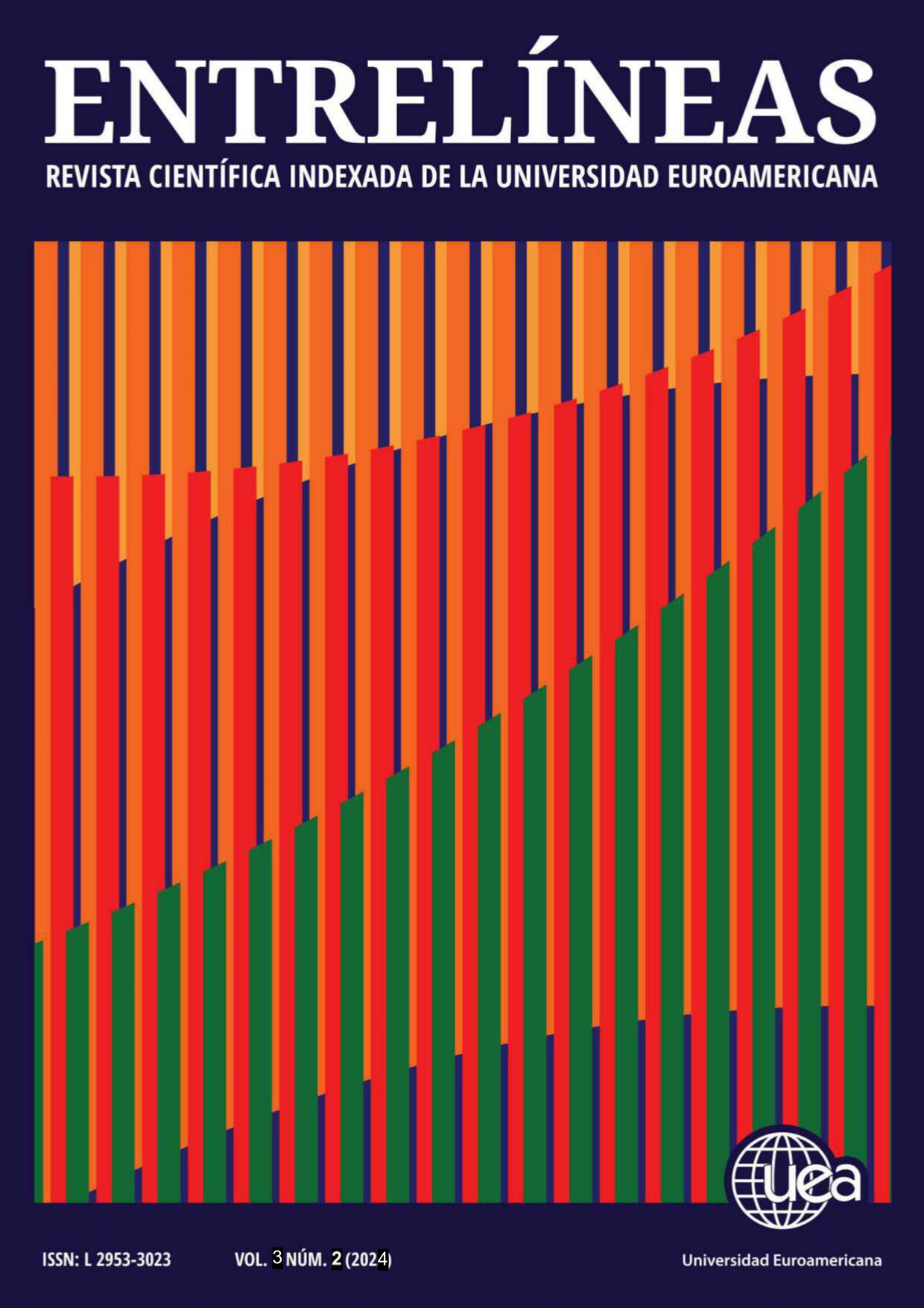Systems Theory, Principle of Synergy and performance in high performance teams
DOI:
https://doi.org/10.56368/Entrelineas321Keywords:
management, synergy, high performance teams, Systems Theory, organizational performanceAbstract
The purpose of this study is to analyze how the principle of synergy, from Systems Theory, influences the performance of high-performance teams in business organizations. With a mixed design, the theoretical review of von Bertalanffy's Systems Theory and the principle of synergy proposed by Ansoff was combined with an empirical analysis of the data to build, around the theory, a hypothetical exercise that would show the functioning of high-performance teams, using the three basic premises of Systems Theory. The results show how teams can achieve results that are significantly greater than the sum of their individual parts. The importance of team management is highlighted, offering a theoretical and practical vision about the way in which their efforts can contribute to performance within the business context, using synergy.
Downloads
References
Ansoff, H. I. (1957). Strategies for diversification. Harvard Business Review, 35(5), 113-124. https://acortar.link/n4tmcg
Ansoff, H. I. (1965). The concept of strategy. Taylor & Francis.
Ayoví-Caicedo, J. (2019). Trabajo en equipo: clave del éxito de las organizaciones. Revista Científica FIPCAEC (Fomento de la investigación y publicación científico-técnica multidisciplinaria). Polo de Capacitación, Investigación y Publicación (POCAIP), 4(10), 58-76. https://doi.org/10.23857/fipcaec.v4i10.39
Baker, W.E. & Sinkula, J.M. (1999). The synergistic effect of market orientation and learning orientation on organizational performance. Journal of the Academy of Marketing Science, 27, 411–427. https://doi.org/10.1177/0092070399274002
Blanchard, K., Randolph, A. & Grazier, P. (2007). Tres pasos claves para crear un equipo de alto nivel. Alienta Editorial.
Fernández López, F. (2022). Comunicación efectiva y trabajo en equipo. Editorial Tutor Formación.
Herrera, R. F., Muñoz, F. C. & Salazar, L. A. (2017). Diagnóstico del trabajo en equipo en estudiantes de ingeniería en Chile. Formación universitaria, 10(5), 49-58. http://dx.doi.org/10.4067/S0718-50062017000500006
Hussey, D. (1999). Igor Ansoff's continuing contribution to strategic management. Strategic Change, 8(7), 375-392. https://doi.org/10.1002/(SICI)1099-1697(199911)8:7<375::AID-JSC462>3.0.CO;2-U
Ingham, A. G., Levinger, G., Graves, J. & Peckham, V. (1974). The Ringelmann effect: Studies of group size and group performance. Journal of experimental social psychology, 10(4), 371-384. https://doi.org/10.1016/0022-1031(74)90033-X
Johansen, O. (2004). Introducción a la teoría general de sistemas. Limusa.
Karatas, I. & Budak, A. (2023). Investigating the impact of lean-BIM synergy on labor productivity in the construction execution phase. Journal of Engineering Research, 11(4), 322-333. https://doi.org/10.1016/j.jer.2023.10.021
Kravitz, D. A. & Martin, B. (1986). «Ringelmann rediscovered: The original article». Journal of Personality and Social Psychology, 50 (5), 936-941. https://doi.org/10.1037/0022-3514.50.5.936
Kumar, M. & Rodrigues, V. S. (2020). Synergetic effect of lean and green on innovation: A resource-based perspective. International Journal of Production Economics, 219, 469-479. https://doi.org/10.1016/j.ijpe.2018.04.007
Larson Jr, J. R. (2013). In search of synergy in small group performance. Psychology Press. https://doi.org/10.4324/9780203848784
Lawford, G. R. (2003). Beyond success: Achieving synergy in teamwork. The Journal for Quality and Participation, 26(3), 23. https://www.proquest.com/docview/219147502?sourcetype=Scholarly%20Journals
Lee, R., Lee, J. H. & Garrett, T. C. (2019). Synergy effects of innovation on firm performance. Journal of business research, 99, 507-515. http://dx.doi.org/10.1016/j.jbusres.2017.08.032
Littré, É. (1872). Dictionnaire de la langue française. Hachette.
Merlano Medrano, S. (2011). Sinergia en el ambiente de trabajo. Contribuciones a las Ciencias Sociales (2011-07). https://n9.cl/s9p88
Messersmith, J. G. & Guthrie, J. P. (2010). High performance work systems in emergent organizations: Implications for firm performance. Human Resource Management: Published in Cooperation with the School of Business Administration, The University of Michigan and in alliance with the Society of Human Resources Management, 49(2), 241-264. https://doi.org/10.1002/hrm.20342
Mirabal González, J.F. (2019). El árbol para la innovación. Amazon.
Morin, E. (2005). Epistemología de la complejidad. En Solana Ruiz J. Con Edgar Morin, por un pensamiento complejo: implicaciones interdisciplinarias. Universidad Internacional de Andalucía-Ediciones Akál.
Muñoz Cuchca, E. & Solís Trujillo, B. P. (2021). Enfoque cualitativo y cuantitativo de la evaluación formativa. Revista de Ciencias Humanísticas y Sociales (ReHuSo), 6(3), 1-16. https://doi.org/10.5281/zenodo.5512591
Sánchez Flores, F. A. (2019). Fundamentos epistémicos de la investigación cualitativa y cuantitativa: consensos y disensos. Revista Digital de Investigación en Docencia Universitaria, 13(1), 102-122. https://dx.doi.org/10.19083/ridu.2019.644
Simms, A. & Nichols, T. (2014). Social loafing: A review of the literature. Journal of Management, 15(1), 58-67. https://acortar.link/1HCFdm
von Bertalanffy, L. (1968). General system theory. George Braziller Inc.
West, M.A. (1994). Effective teamwork. UK: BPS Books.
Witte, E. H. (1989). Köhler rediscovered: The anti‐Ringelmann effect. European Journal of Social Psychology, 19(2), 147-154. https://doi.org/10.1002/ejsp.2420190206
Zigon, J. (1994). Measuring the performance of work teams. The Journal of Total Rewards, 3(3), 18. https://acortar.link/9DoPei
Downloads
Published
Issue
Section
License

This work is licensed under a Creative Commons Attribution-NonCommercial 4.0 International License.
You are free to:
- Share — copy and redistribute the material in any medium or format
- Adapt — remix, transform, and build upon the material
- The licensor cannot revoke these freedoms as long as you follow the license terms.
Under the following terms:
- Attribution — You must give appropriate credit , provide a link to the license, and indicate if changes were made . You may do so in any reasonable manner, but not in any way that suggests the licensor endorses you or your use.
- NonCommercial — You may not use the material for commercial purposes .
- No additional restrictions — You may not apply legal terms or technological measures that legally restrict others from doing anything the license permits.










